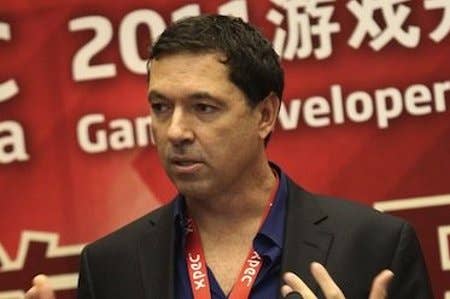Fargo: "Without corporate interruption, we're kicking ass"
Brian Fargo on Wasteland 2's rapid progress due to financial independence and the Unity Asset Store
InXile's Brian Fargo used his keynote address at this year's Unite conference to put the value of creative autonomy for Wasteland 2 in the frankest possible terms.
"We've been working on Wasteland 2 for about 100 days, with no distractions from any kind of corporate overlord," he said. "We have hundreds of pages of design done, we have our first music in, we have our basic UI up-and-running, and we've taken our first screenshots.
"The bottom line is that, without any interruption, we're kicking ass."
Fargo detailed the way the industry has "come full circle" since he began his career 30 years ago, shifting away from the console model that has dominated since the late Nineties and back towards "two and three man teams" empowered by new platforms, new distribution methods, robust tool-sets like Unity, and financing secured through crowd-funding.
"The best creative work we're seeing is from creative people who have the power, or the financing, to control their destinies... They can keep the craziness at bay"
InXile raised more than $3 million for its long gestating Wasteland 2 project through Kickstarter. Along with Double Fine's Kickstarter Adventure, InXile's success helped to drive the current enthusiasm for crowd-funding in game development, but Fargo believes the implications of crowd-sourcing will reach further than simply raising finance.
"I'm slow to the party on this one, but we're really utilising it in a big way. People ask why we chose Unity, and it has a lot of technical positives, but really, for me, it came down to the store, the communication and the sharing of knowledge. That's the real power of Unity; it's not the technical aspects. You can't beat the crowd."
The current build of Wasteland 2 uses 49 different assets from Unity's Asset Store, and Fargo expects that number to reach 500 by the time the game ships. This sharing of expertise has allowed InXile to make rapid progress, and get the most out of its budget.
With systems like Kickstarter and Unity in place, more and more developers will be able to build financial security without sacrificing creative control - a rarity even five years ago. This combination of factors, Fargo said, leads to the very best work the industry produces, even in the commercial sector.
"Corporations don't have artistic integrity; people do. This sort of integrity impacts on production and how a property is exploited... There are employees of these organisations that have this integrity, but they don't have the power to do anything about it.
"The best creative work we're seeing is from creative people who have the power, or the financing, to control their destinies... These visionaries can be within an organisation: Rockstar would not achieve the level of quality it does if Sam Houser wasn't running that place with an iron fist. He's not a corporation; he's a person."
"If one Minecraft comes along, that's going to put $2m or $3m back into the ecosystem to for other people, and it's going to help find the next one"
Fargo listed several other examples to support his thesis, all of which have either total creative control or financial independence to take their time and pursue their ideas: Shigeru Miyamoto, Yu Suzuki, Hideo Kojima, Ken Levine, Valve, Blizzard, Epic Games.
"They can keep the craziness at bay," he said.
In the independent sector, designers like Jonathan Blow and Edmund McMillen have illustrated what can be accomplished with autonomous creativity, and Kickstarter gives these people even simpler access to the fans and funding that can make it happen.
Fargo also noted the philanthropic nature of successful developers, pointing to other indie designers as the source of Wasteland 2's largest Kickstarter pledges.
"Look at Notch. He's invested hundreds of thousands of dollars in Kickstarter projects. You don't see that coming from publishers. As we do well, we tend to help each other out. Once there are more developers that control their destiny through IP ownership or otherwise, it will allow the wealth in our business to be distributed more evenly.
"Good things always come from that. When so much of the money is consolidated in a few publishers, it's no good for any of us."
Since InXile's success with crowd-funding, Fargo has started an initiative called Kicking It Forward: the group's members will pledge 5 per cent of any profits from their crowd-funded projects back into the Kickstarter ecosystem. So far, 100 projects have committed to the idea.
"If one Minecraft comes along, that's going to put $2 million or $3 million back into the ecosystem to for other people, and it's going to help find the next one."

